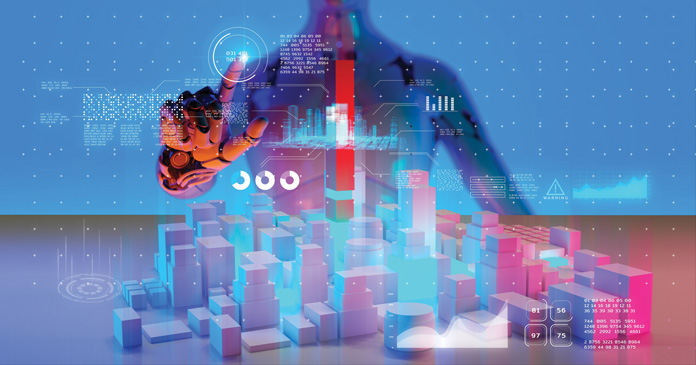
Property managers are being caught between a rock and hard place as the cost-of-living crisis continues to affect the housing market.
Residents are facing financial challenges due to stubborn inflation, while high interest rates mean property managers’ costs are climbing ever upwards. The result is that profit margins are being squeezed as rents fail to keep up with high bills.
Reducing costs and finding efficiencies is the clearest route to maximizing profits, and smart property managers are turning to technology to save on costs. Smart property technology enables property managers to control heating and cooling systems, security, maintenance and other building functions remotely.
Automation is one of the best-kept secrets of those running successful multifamily units, with solutions available for every part of the home—from keyless locks to intelligent heating systems.
Properties with smart technology benefit residents and property managers alike, offering convenience, security and increased energy efficiency. Property managers can save on staff and maintenance costs, while residents enjoy complete control over their home, no matter where they are. The benefits of automation increase with the number of smart systems being used, putting more money back into the property manager’s pocket and improving residents’ experience.
These are the top solutions worth considering to help keep costs low and resident satisfaction high.
Smart thermostats
Heating and cooling are two of the biggest costs for residential units, and smart thermostats can reduce energy waste, especially in communal areas, saving property managers 16-23 percent on energy bills a month.
Managing temperatures remotely saves maintenance staff from having to travel to the property and adjust settings manually.
Smart thermostats can also save time monitoring vacant units, and prevents energy from being wasted when heating or cooling systems are left running unnecessarily for long periods of time.
Smart water management solutions
The average household’s leaky appliances can waste 10,000 gallons of water a year, according to Environmental Protection Agency. Burst pipes, slow drips and leaky appliances can waste huge amounts of water and cause costly damage to a property if left undetected.
Smart water management systems use water detectors, shut-off valves and low-flow meters to sense issues before they become expensive problems. Meters automatically shut off the water mains as soon as a leak is detected, and sensors that spot low water temperatures can prevent burst pipes by acting before they freeze.
Property managers receive updates to their app every time issues are detected, and they can monitor water consumption to encourage residents to use water appropriately.
The protection given by smart water management systems can save thousands of dollars in insurance costs by preventing costly claims.

Heating, ventilation and air conditioning (HVAC) systems
HVAC systems are usually a property’s highest running cost, making it one of the most important places for a property manager to focus their attention. Intelligent monitoring can learn what issues the system regularly faces, and alert the property manager when a heating or cooling issue arises.
If a HVAC system is taking too long to reach the desired temperature it may be a warning sign that a problem is brewing. Spotting the issue early reduces maintenance costs and increases the lifespan of the system.
Residents will also benefit from a well-monitored HVAC system, and property managers can spot problems before the first hot or cold day of the season puts the unit under pressure.
Intelligent monitoring systems constantly gather data, meaning they become smarter over time and produce better results the longer they are in operation.
Keyless locks
Maintaining security in multifamily units can be a challenge due to residents, delivery people and maintenance workers coming and going around the clock.
Keyless locks allow property managers to control access permissions for staff across multiple sites, or remotely buzz in contractors from an app. Smart locks reduce overhead costs by reducing wasted trips to deal with residents locking themselves out—with keyless systems found to cut lock-outs by 75 percent.
They also eliminate the hassle of replacing lost keys, or changing locks when rentals change hands.
Video intercoms also give residents peace of mind by letting them see who is buzzing at their front door.
Self-guided tours
Long vacancy periods will quickly eat into a property manager’s profit margins, and self-guided tours can help bring in tenants by increasing showing hours.
Prospective residents are given a temporary smart key that lets them into the relevant parts of the property, letting them tour the unit at their own pace. Self-guided tours save on staff costs, and let potential tenants visit the property at a time that suits them. Property managers are kept in the loop with notifications when tours are booked, and all the information is kept in a sales pipeline for following up with prospects.
Combining savings
Each of the above systems will make the running of a multifamily property more efficient, but utilizing all of them will compound the benefits.
Using a single platform that can manage all their smart property devices will increase the savings, and stop property managers from having to train staff to use multiple solutions from different providers.
Costs involved in installing smart technologies are quickly recouped by reduced energy costs and lower resident turnover—which still costs property managers $4,000 per change of tenant. There’s also the fact that “modern living features” are the top reason renters renew their lease, according to The State of Resident Experience Management Report.
Creating a more comfortable living space means tenants are more likely to stay in the property and be more willing to pay a higher rent.
Consumers are increasingly aware of the environment, and eco-conscious tenants are always looking for ways to reduce their carbon footprint and stop using energy unnecessarily. In properties where smart technologies are used, the asset value of the building itself is higher, due to improved rent and efficiency.
Smart homes are a win-win for residents and owners alike—smart property managers utilizing the benefits of property automation.
Author Mike Branam, director of multifamily, PointCentral












